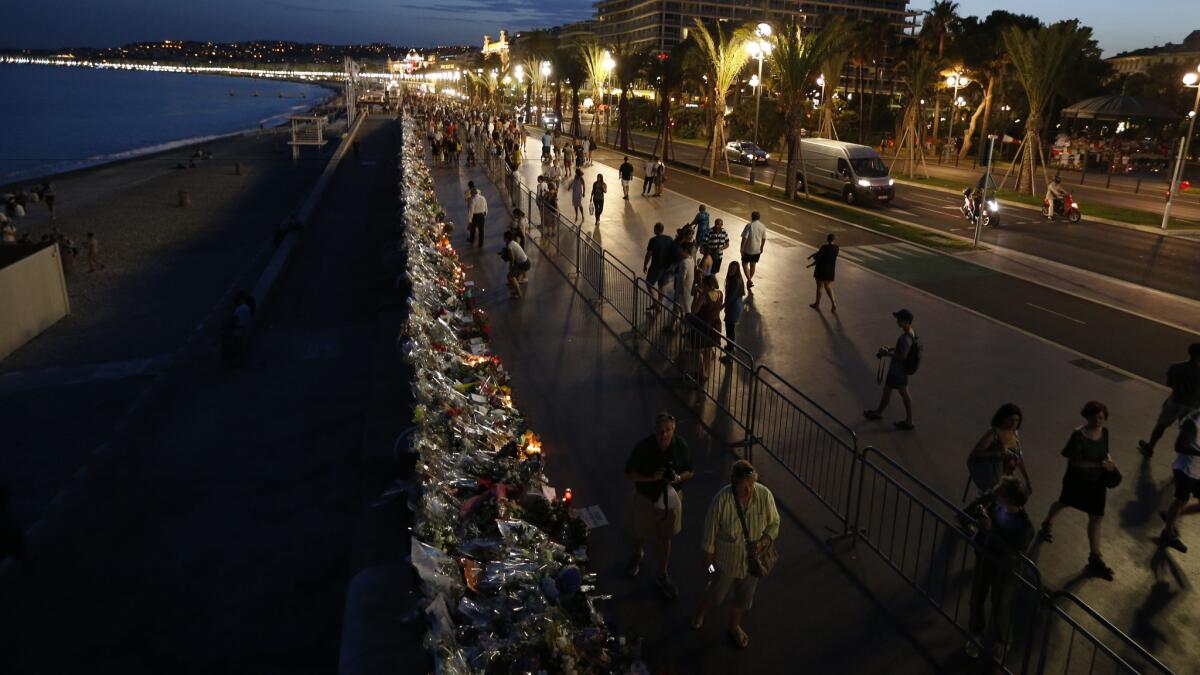French prosecutor says killer of 84 in Nice had accomplices and planned attack for months

Reporting from PARIS — The assailant who plowed a truck into crowds celebrating the July 14 Bastille Day holiday in France, killing 84 and injuring hundreds, apparently planned his attack for months and had accomplices who face terrorism charges, authorities said Thursday.
French investigators originally thought Mohamed Lahouaiej Bouhlel, who was shot and killed by police during the attack, had acted alone during the massacre at the Promenade des Anglais in Nice.
Prosecutor Francois Molins said that after what he described as “significant advances” in the investigation, it was clear the attack had been premeditated for several months.
Photographs from Bouhlel’s cellphone, call records and computer searches revealed he had visited the area of the attack several times before July 14.
Bouhlel, a Tunisian immigrant, was also in regular contact with five suspects, two of whom — an Albanian-born man and a woman of Albanian-French nationality identified as husband and wife — are accused of supplying the automatic pistol he used against police before they shot him dead, officials said.
On Thursday, the four men and the woman, all accused of giving Bouhlel logistical support, appeared before an investigating judge and facing preliminary charges of being accomplices to “murder as part of a terrorist organization.”
Speaking at a televised news conference, Molins said that like Bouhlel, none were previously known to France’s anti-terrorism or intelligence services.
“The investigation since the night of July 14 has continually advanced and allowed us not only to confirm again the premeditated nature of Mohamed Lahouaiej Bouhlel’s deadly act, but also to establish that he benefited from support and had accomplices in the preparation and carrying out of his criminal act,” Molins said.
The attacker’s telephone contained pictures of the Bastille Day fireworks in July 2015, and an article referring to the “magic potion called Captagon,” an amphetamine-type substance that Molins said was “used by certain jihadists preparing terrorist attacks.”
Authorities said investigators found a photograph showing one of the five suspects in the cab of the truck used in the massacre three hours before the attack.
Investigators also said they found a message on Bouhlel’s cellphone referring to the January 2015 attack in Paris at the satirical newspaper Charlie Hebdo in which 12 people were gunned down by an Islamist terrorist.
The message read: “I am not Charlie. I’m happy they have brought us Allah’s soldiers to finish the job.” Molins did not explain what the message meant.
The Islamic State extremist group has claimed indirect responsibility for the Nice attack, but Molins said investigators had yet to establish a direct link between the suspects and the group.
Also Thursday, Interior Minister Bernard Cazeneuve admitted there had been no national police presence at the entrance to the area closed off for the celebrations, contrary to what he had said before, and only lightly armed local police at the scene.
French national newspaper Liberation had reported that the lack of national police officers and cars at the entrance had allowed Bouhlel to drive unchallenged more than a mile down the promenade. The paper accused Cazeneuve of misleading the public about the level of security in Nice that night.
Cazeneuve accused the paper of promoting conspiracy theories and said there were “heroic” national police who shot dead the attacker stationed further down the promenade.
Cazeneuve has ordered an internal investigation into how police handled the situation, but French President Francois Hollande rebutted accusations of a lack of transparency over security.
Hollande said there was “no room for polemics” at a time the country is on high alert and a state of emergency. The results will be known next week, according to Hollande, who added that any shortfalls would be “carefully addressed.”
Willsher is a special correspondent.
ALSO
Court convicts youthful leader of Hong Kong’s pro-democracy protests
Turkey declares three-month state of emergency days after attempted military coup
U.S.-backed airstrike against Islamic State kills dozens of civilians in Syria, activists say
UPDATES:
1:55 p.m.: This article has been updated with Times reporting.
This article was originally published at 9:55 a.m.
More to Read
Sign up for Essential California
The most important California stories and recommendations in your inbox every morning.
You may occasionally receive promotional content from the Los Angeles Times.










